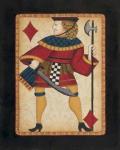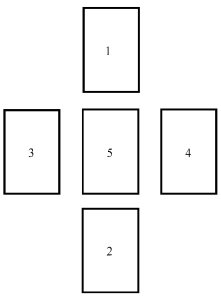Divinatory Meanings for the Whole Deck
June 24, 2013 2 Comments
N.B. The story of the my search for the oldest set of traditional meanings for the cards is to be found in the preceding posts covering parts 1 and 2 of ‘Tradition’ in Playing Card Meanings. In the post below, I explain why I made certain changes to the original set of meanings and describe what those changes are. A.T.
‘Tradition’ in Playing Card Meanings, part 3
The card meanings I employ myself bears a distinct relationship with those in Madame Fabia’s book (The Book of Fortune Telling: (2) How to Read Signs and Portents, republished 1974). Finding that these meanings go back to those published by Sepharial (The Art of Card Fortune Telling) and A.E. Waite (A Manual of Cartomancy and Occult Divination, 1909) or to a tradition they both drew on, caused me to reconsider my position. I asked myself this question. If these meanings constitute the oldest British tradition regarding playing cards, ought I not to take them on, in the spirit of returning to basics? Although I tended in the direction of answering that question with a ‘yes’, it was obvious to me that the Waite/Sepharial meanings didn’t suit the modern age as well as they presumably had suited the time when they were committed to print. They are angled towards women interested in discovering the coloring and character traits of prospective suitors and estimating their prospects in matrimonial stakes.
In short, I encountered the same problem as others had when attempting to work with Madame Fabia’s 1934 delineations in the latter part of the twentieth century and the beginning of the twenty-first when social conditions are utterly different from what they were before World War Two, let alone, in respect of the Sepharial/Waite versions (c. 1909 – 1913), prior to World War One. I therefore set about tweaking the Sepharial/Waite meanings, replacing those applicable only to marriage (e.g., 3 Clubs – ‘indicates a second marriage’ and 6 Diamonds – ‘early marriage and widowhood’) with more apt and broader delineations. Borrowing from my forerunners on the Net, I coopted ‘Love and happiness; successful marriage; a favorable long-term proposition. A second change, particularly from a monetary angle’ as the meaning for the 3 of Clubs and ‘Relationship problems, arguments. Separation’ for the 6 of Diamonds. And so on.
With the single exception of Sepharial saying that the Ace of Spades reversed can indicate a death, the Sepharial/Waite leave reversals severely alone. Following an internal tussle, I elected to stay with the original concept. No reversals recorded. If a card was reversed, it might be interpreted, depending on the cards surrounding it, as (i) the same as when upright, (ii) the same but to a lesser degree or (iii) the opposite of what it is when upright. In the last instance, the 5 of hearts, whose upright significance is ‘a change for the better’, would indicate ‘a change for the worse’ – but only if situated between very negative cards.
The important thing about a method of divination is that it must encompass all facets of human experience – love, hate, birth, death, promotion, redundancy, martial brake-up, etc., etc. The adjusted list does that. It covers scandal, loss of friends, reverses, quarrels, sickness, invitations, travel and temptation. This in addition to the indications one would expect to find on the list: happiness (four mentions), success (two mentions), marriage (four mentions), love (one mention) and change (four mentions). I regard it as fit for purpose – certainly it is fitter for purpose in current circumstances than the original.
Here then is my ‘new and improved’ list of divinatory meanings. I have adopted it myself and I recommend it to others.
The Heart Suit
Ace. – This indicates your home, and if Spade cards touch it quarrelling is foretold. If other Hearts are next to it they foretell friendships and true affection. If Diamonds, money and distant friends – and if Clubs, feasting and merry making.
King. – A fair man, of good natured disposition, but hasty and rash.
Queen. – A fair woman, faithful, prudent and affectionate.
Jack. – A close friend or a good-natured, fair-haired youth.
Ten. – Is prophetic of happiness and many children; is corrective of the bad tidings of cards next to it, and confirms their good tidings.
Nine. – Money and position. Also, where the cards are consulted about one single question or wish, the nine of Hearts is the key card upon which all depends.
Eight. – Pleasure, companions. Invitations and festivities.
Seven. – A fickle and false friend, against whom be on your guard.
Six. – A generous person. Someone takes care of you, takes warm interest in you.
Five. – Troubles caused by unfounded jealousy.
Four. – Changes, delays and postponements (especially of marriages).
Three. – Sorrow caused by your own indiscretion.
Two. – Success, but it will need care to secure it.
The Club Suit
Ace. – Peace of mind, happiness; a success card.
King. – The influence in your life of a dark man, upright, faithful and affection.
Queen. – A dark woman, gentle and pleasing.
Jack. – A generous, sincere, and constant friend whose devotion is never in question.
Ten. – Unexpected good.
Nine. – Achievement; sometimes a wealthy marriage or a sudden windfall.
Eight. – Trouble in relationships, business and personal. Jealousy and greed.
Seven. – Promises good fortune and happiness but bids a person beware of the opposite sex.
Six. – Business success.
Five. – New friends and a successful marriage. Help from friends.
Four. – Be careful when making changes to your plans or mode of life.
Three. – Love and happiness; successful marriage; a favorable long-term proposition. A second chance, particularly from a monetary angle.
Two. – A disappointment, but not a serious one, unless other prophetic cards are bad.
The Diamond Suit
Ace. – A letter – but from whom and what about must be judged by the neighboring cards.
King. – A fair man, hot tempered, obstinate and revengeful.
Queen. – A fair woman, fond of company and a coquette.
Jack. – A near relation who considers only his own interests. Also a fair person’s thoughts.
Ten. – A change in financial status, often for the better.
Nine. – Travel.
Eight. – Ups and downs, particularly of a financial nature.
Seven. – Unpleasant rumors, scandal.
Six. – Relationship problems, arguments. Separation.
Five. – A change for the better. A birth, or good news concerning a child. A good time to start new projects.
Four. – Trouble through friends, a secret betrayed.
Three. – Quarrels, legal trouble and domestic disagreements.
Two. – A love affair attracting disapproval from others. A business partnership.
The Spade Suit
Ace. – Great Misfortune. Death when the card is reversed.
King. – A dark ambitious man.
Queen. – A dark woman, or her thoughts.
Jack. – A dark young man, or his thoughts.
Ten. – Grief and trouble.
Nine. – Sickness and misfortune, a most unlucky card.
Eight. – Temptation, misfortune, danger, upsets, false friends.
Seven. – Loss of a friend, attended with much trouble.
Six. – Money through hard work.
Five. – Reverses and anxieties, but eventual success.
Four. – A brief illness, temporary financial reverses, and warns against the petty jealousy of others.
Three. – A marriage that will be marred by the inconstancy of the inquirer’s wife or husband; or a journey.
Two. – Separation, scandal, gossip and deceit. Difficult changes.






